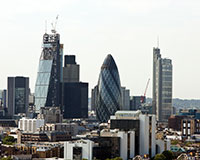The Financial Conduct Authority has shortlisted options in its search for a 400,000 sq ft London headquarters, setting up a fierce political battle that could reshape the capital’s business districts.
Two options are leading the list of four, pitting Canary Wharf Group’s Heron Quays, E14, (below, left) against Lend Lease’s The International Quarter, E20 (right).
The full shortlist includes a City option at Brookfield’s Principal Place, EC1, or staying put in existing headquarters at 25 North Colonnade, E14, and no formal decision has been made to rule these out.
However, given the higher rents in the City and the age, size and uncertain ownership of 25 North Colonnade (see box), the decision is likely to be a straight contest between the two frontrunners.
As a state empowered – but privately funded – organisation, the FCA now has a momentous decision to make which is provoking furious behind-the-scenes lobbying, not least from the Treasury.
Here, Estates Gazette examines the options facing the organisation and sets out the competing arguments from which it must choose.
As it decides whether to stay or move, the latter will always be the risky option.
But Stratford has several key selling points up its sleeve.
First, it will be considerably cheaper with rents of around £35 per sq ft compared with £45 per sq ft in Canary Wharf.
Compound that with business rates of around £7 per sq ft against close to £15 per sq ft and it adds up to a big difference.
While that saving will mainly benefit the banks that fund the FCA, Stratford can be sold as a win for the taxpayer too.
Australian giant Lend Lease is developing the site, which includes 4m sq ft of offices, in joint venture with London and Continental Railways.
Given LCR is state owned and George Osborne announced plans in the autumn statement to sell off its property assets, a move to Stratford would be good for the nation’s finances.
It would also help guarantee the taxpayer-funded regeneration of Stratford via the Olympic Games, with a viable new business district.
But that plays into the next key point.
Fresh from hosting a successful Olympics, Stratford can present itself as the green and wholesome choice, which would fit the bill for the organisation in charge of protecting the consumer from the misdeeds of the financial services industry.
Or, to turn that on its head, how appropriate is it for a financial regulator to set up in the shadow of the world’s biggest investment banks at Canary Wharf?
For Canary Wharf the decision poses a new challenge.
For the past 20 years it has been the young pretender to the established City of London.
Now it must reinvent itself as the safe option in the face of new competition. But it would argue that any of its perceived weaknesses can equally be seen as strengths. Rent might be higher but what cost in staff retention and attraction will a move to Stratford entail?
And far from creating the wrong impression by housing the gamekeeper among the poachers, the FCA might feel it needs the banks to know it is watching and listening from just across the wharf.
Canary Wharf has also done much to solve its image problem as a lifeless business district and still boasts the lowest crime rate of anywhere in the UK.
Both sides now wait with bated breath for a decision towards the end of the month – the one firm deal being the European Medicines Agency which picked Canary Wharf over Stratford in 2011.
Revamp bid to persuade FCA to stay
The fight to keep the FCA in its existing building is almost equally intriguing, with 25 North Colonnade requiring a serious makeover, particularly its outdated lift systems.
Evans Randall has come up with a £50m plan designed by TP Bennett to refurbish the building while keeping the FCA in it.
But the landlord failed to repay a £205m loan securing the building when it came due on 18 October, putting new special servicer Hudson Advisors in control.
If Evans Randall can convince Hudson and the bondholders they represent ?to invest the money to keep their tenant – and convince the tenant that they can convince Hudson – then ?they still stand an outside chance.
If not, expect the building to be sold soon after the FCA makes its mind up; a 2012 valuation was at £160m.
Jack.Sidders@estatesgazette.com











